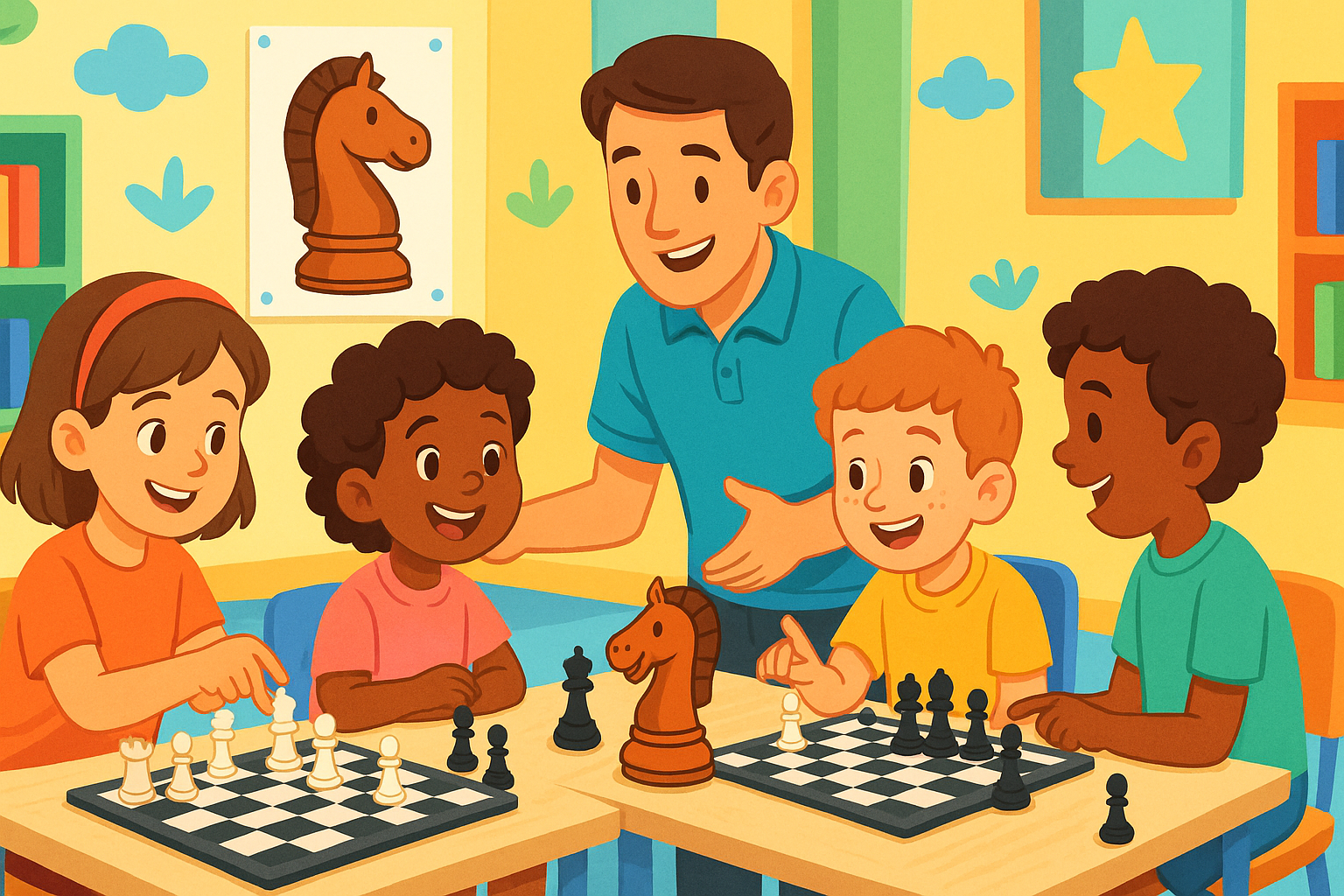
- Sprouts Chess Academy
- May 6, 2025
- Chess
- 0 Comments
Chess for kids is more than just a game—it’s a powerful tool that nurtures young minds. In today’s fast-paced digital age, where screen time dominates childhood, introducing kids to chess can bring balance. It improves concentration, enhances decision-making, and fosters creativity—all while being incredibly fun.
For parents seeking productive activities that keep children engaged and mentally stimulated, chess for kids offers the perfect solution. But how do we make learning chess enjoyable and engaging for young learners?
Let’s explore how chess can be a fun-filled learning experience and why many parents are enrolling their children in the best chess academy to guide them on this exciting journey.
Why Chess for Kids is the Ultimate Brain Booster
Studies show that children who play chess regularly perform better in school, especially in subjects like math and reading. Here’s why chess for kids stands out as a mental workout:
- Improves problem-solving skills: Kids learn to think critically and make decisions under pressure.
- Enhances memory: Remembering chess patterns sharpens memory and recall abilities.
- Boosts concentration: Chess requires full focus, helping children develop longer attention spans.
- Promotes strategic thinking: Young players learn to think ahead and anticipate outcomes.
The benefits go far beyond academics. Chess also teaches patience, resilience, and sportsmanship—qualities every child needs to succeed in life.
Discover the Mastery of Chess
Join our FREE Demo Chess Classes and unlock your strategic potential. Perfect for beginners and aspiring chess players, these engaging sessions provide expert guidance and practical learning.
- ✔ Learn the rules and basics of chess
- ✔ Master opening strategies
- ✔ Sharpen your tactical thinking
- ✔ Compete in tournaments
Hurry! Limited seats available. Reserve your spot today.
Making Chess Fun for Kids
Many parents worry that chess might be too complex or serious for young children. The key lies in the approach. Here are some ways chess can be made fun and engaging:
1. Start with Stories and Characters
Instead of jumping into rules and notations, many coaches use stories to introduce chess. For example, calling the King “the slow-moving ruler who must be protected” and the Knight “the jumping horse” adds personality to the pieces. Kids love learning through storytelling, and this approach makes the game more relatable.
2. Use Visual and Interactive Tools
Colorful boards, 3D chess sets, and digital chess games can hold a child’s interest. Several online platforms also offer gamified lessons designed especially for chess for kids, turning every move into an exciting challenge.
3. Short and Playful Sessions
Children learn best in small bursts. Short 20–30 minute sessions, combined with fun challenges like “Checkmate in 2 moves,” keep them engaged without feeling overwhelmed.
4. Group Play and Tournaments
Kids love playing with peers. Introducing friendly tournaments or weekly chess clubs not only makes the game social but also encourages healthy competition. Many of the best chess academies incorporate team play and mini-challenges that build both skill and confidence.
Why Start Chess at an Early Age?
The earlier children are introduced to chess, the easier it becomes for them to grasp advanced strategies over time. Here’s why starting young is ideal:
- Cognitive flexibility: Young minds adapt quickly to new rules and thinking patterns.
- Natural curiosity: Kids are eager to learn and explore, making them more open to trying new strategies.
- Habit formation: Regular practice from an early age helps make chess a lifelong habit.
Introducing chess for kids early doesn’t mean pressuring them—it’s about allowing them to explore the game at their own pace while offering the right environment and encouragement.
How Parents Can Support Chess Learning at Home
Parental involvement can make a huge difference in a child’s chess journey. Here’s how parents can support learning:
- Play with your child: Even if you’re a beginner, playing together boosts motivation.
- Set a routine: Consistent practice helps build skill and confidence.
- Celebrate progress: Praise small achievements like learning a new opening or winning a mini-game.
Parents can also enroll children in the best chess academy to ensure structured guidance and expert mentorship.
Choosing the Right Chess Academy for Kids
Not all learning environments are created equal. When looking for a place to nurture your child’s chess skills, keep the following in mind:
1. Child-Centric Approach
The best chess academy for kids focuses on age-appropriate teaching methods. Look for academies that balance instruction with games, fun assignments, and peer interaction.
2. Certified and Passionate Coaches
Good coaches don’t just teach—they inspire. Certified instructors who understand how children learn can make all the difference in your child’s chess experience.
3. Progress Tracking and Feedback
Regular feedback and progress tracking motivate kids to improve. Choose an academy that provides performance reports and encourages goal-setting.
4. Flexible Learning Options
Whether it’s online classes, weekend workshops, or one-on-one coaching, flexibility allows kids to learn at their own pace.
Technology + Chess = A Winning Combo
Today’s generation loves gadgets, and chess has beautifully evolved to embrace this digital love. Many apps and online tools make chess for kids interactive, visual, and gamified.
Features like animated lessons, puzzles, live competitions, and video coaching keep children hooked while they learn. These tech-driven platforms also allow parents to monitor progress easily.
Still, nothing beats the structure and guidance provided by a professional coaching center. That’s where the best chess academies bridge the gap—offering the perfect blend of fun, mentorship, and discipline.
Why Sprouts Chess Academy is a Great Place to Start
Looking for expert chess training that makes learning fun for kids? Sprouts Chess Academy is a trusted name for structured and engaging chess programs tailored specifically for children.
From beginner-friendly lessons to competitive coaching, Sprouts Chess Academy offers:
- Age-specific learning modules
- Friendly, FIDE-rated coaches
- Weekly tournaments and events
- Flexible online and offline options
- A supportive and engaging environment
Whether your child is just starting or already plays casually, Sprouts Chess Academy helps them unlock their full potential. Take the first step towards making your child a confident thinker and future chess champion.
Discover the Mastery of Chess
Join our FREE Demo Chess Classes and unlock your strategic potential. Perfect for beginners and aspiring chess players, these engaging sessions provide expert guidance and practical learning.
- ✔ Learn the rules and basics of chess
- ✔ Master opening strategies
- ✔ Sharpen your tactical thinking
- ✔ Compete in tournaments
Hurry! Limited seats available. Reserve your spot today.
Conclusion: Building Lifelong Skills Through Chess
Chess for kids isn’t just about winning games—it’s about developing life skills in a fun and supportive way. From boosting academic performance to nurturing creativity and focus, chess offers countless benefits for children.
By making chess engaging, encouraging peer play, and choosing the right guidance through the best chess academy, parents can ensure their child’s journey is both joyful and rewarding.
Now is the perfect time to introduce your child to the magical world of chess. With the right support and a bit of playfulness, your child could be the next great chess mind in the making.
Frequently Asked Questions (FAQ)
1. What is the right age to introduce chess to kids?
Children as young as 4 or 5 can start learning the basics. At this age, they’re naturally curious and can grasp simple moves through fun storytelling and games.
2. Is chess too difficult for young kids?
Not at all. With the right teaching approach—using characters, stories, and visual aids—chess for kids becomes easy to understand and exciting to learn.
3. Can my child learn chess online effectively?
Yes, many kids thrive with online chess classes. Reputed platforms and the best chess academies offer interactive, instructor-led online sessions that are just as effective as in-person coaching.
4. How much time should a child spend on chess practice?
20–30 minutes a few times a week is a great start for beginners. As their interest grows, they can increase practice time gradually.
5. Does my child need to be good at math to play chess?
No. While chess improves logical thinking, kids don’t need math skills to start. In fact, playing chess can actually strengthen their analytical abilities over time.




